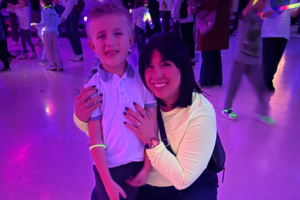But what does that mean to a child?
I’d like to start off by saying my husband and I are not getting a divorce! I repeat, Mitch and I just celebrated our 10-year anniversary, and we are NOT getting a divorce.
However, the topic of divorce recently came up in our household, and both of our children were made aware of what the term divorce meant and why we were talking about it.
Tell Them What Divorce Is
While every family has to do what’s right for them (and for their kids) in approaching this topic, we had it a little easier since we weren’t talking about us. But no matter the situation, our priorities were to make sure our kids understood what divorce is, let them ask any questions and reiterate the importance of family.
We wanted to tell our children together, even though they’re at different ages. We felt that they could gain support from each other, which they did— more so my daughter looked up to her brother for understanding. And by doing so, no one felt excluded or that there were secrets because everyone heard the same thing.
Don’t Try to Avoid What’s Happening
Before I get to individual advice points, there was a piece of advice we got that calmed my nerves a great deal. The actual “telling” of the situation to the kids was important, but how we acted moving forward was bigger. At the end of the day, words are words, and they never speak as loudly as actions. We wanted to let them know that we’re still one big family, but things were going to look a little differently for holidays, birthdays and special family occasions.
There were two initial things we explained to our children: who was getting the divorce and the reasons why. The reasons why sounded a bit blunt, but we wanted to be honest. The explanation for it was as accurate as possible without confusing them or being too detailed.
Embrace Their Questions
When we told the children about the split, it led to many more questions. The questions were very practical. They wanted to know things like: Where will each of them be living? Will they still see them? Can they still talk to them? Will they still get presents from them on birthdays and Christmas?
It also provoked some insecurities from them about mommy and daddy’s relationship. Will you and dad split up? If you fight or disagree, is that the start of you both separating too? This led to more conversations about relationships, conflict, resolving conflict, love, marriage, and other issues they wondered about. But in the end, this discussion made us closer as a family.
Whatever you decide to tell your children initially, my guess is that the majority of your discussions with them will be about your own family. We made sure to reassure them that mommy and daddy have a secure and stable relationship and that no matter what, everyone is here for them! Again, making them realize the importance of family does not diminish after a divorce. Our family is strong, and our extended family is still strong—and we are committed to helping them maintain those ties.

Mallory Connelly
Babies & Toddlers
In addition to the time I devote to being a mom, I also work full-time outside the home, which means my day is hardly ever as simple as nine to five. With an all-too-established schedule, as soon as I walk through the door, my day doesn’t end, but rather just begins. It’s a balancing act, especially with two children, but being a mom is one full-time job that I never want to quit!









